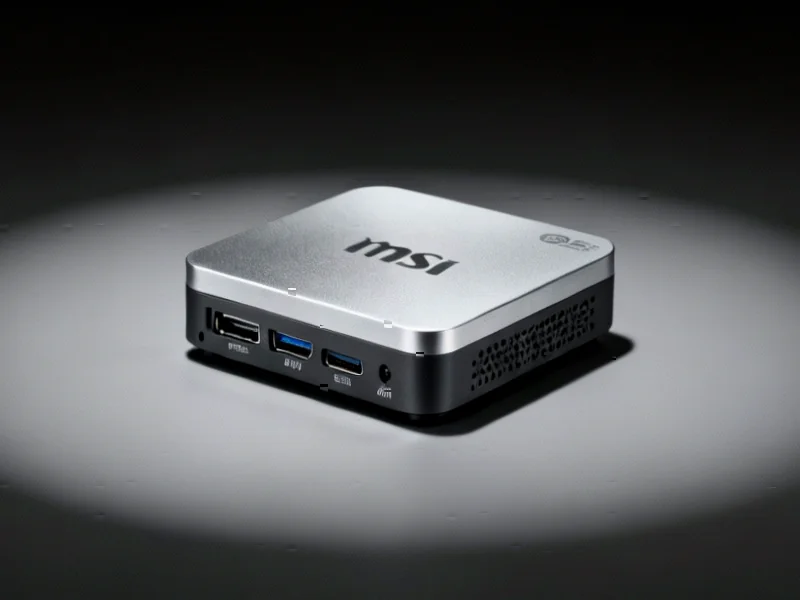Compact Design with Sustainable Materials
MSI has introduced the Cubi Z AI 8M, a remarkably compact mini PC measuring just 136 x 132 x 50mm that doesn’t compromise on performance or environmental consciousness. The system features a chassis constructed from recycled plastic, reflecting the growing trend toward sustainable computing solutions. For flexible placement options, the device supports VESA mounting, allowing users to discreetly attach it to the back of monitors or displays, making it ideal for space-constrained environments.
Performance Specifications and Hardware Capabilities
Despite its small footprint, the Cubi Z AI 8M packs substantial hardware capabilities. The system supports up to 64GB of DDR5-5600 memory through two SODIMM slots and includes an M.2 2280 slot compatible with PCIe 4.0 x4 SSDs for high-speed storage. MSI offers the mini PC with a choice of AMD Hawk Point processors, including the Ryzen 5 8645HS, Ryzen 7 8845HS, or top-tier Ryzen 9 8945HS chips, ensuring solid CPU and graphics performance for everyday computing tasks and beyond.
Connectivity options are comprehensive, featuring dual 2.5 Gigabit Ethernet ports for network redundancy or high-speed data transfer, two HDMI outputs for multiple display setups, and an impressive seven USB ports to accommodate various peripherals. Wireless capabilities are handled by an AMD RZ616 card supporting WiFi 6E and Bluetooth 5.3, keeping the device current with modern connectivity standards.
The AI PC Debate: Marketing vs Reality
MSI’s decision to include “AI” in the product name raises interesting questions about the current state of AI-capable computing. While AMD’s Hawk Point processors do incorporate Neural Processing Units (NPUs), their AI performance peaks at 16 TOPS (Trillions of Operations Per Second). This falls significantly short of Microsoft’s 40+ TOPS requirement for Copilot+ PC certification, highlighting the evolving standards in AI cybersecurity and computational demands.
The naming convention seems reminiscent of earlier industry trends where manufacturers liberally applied the “AI PC” label to any system containing an NPU, regardless of its actual capabilities. As industry developments continue to advance, the gap between marketing terminology and genuine AI performance becomes increasingly apparent. Recent generations of chips from both AMD and Intel have featured substantially more powerful NPUs, making the “AI” designation for the Cubi Z AI 8M somewhat questionable from a pure performance perspective.
Positioning in the Broader Technology Landscape
The Cubi Z AI 8M enters a market where related innovations in compact computing continue to evolve rapidly. While its AI capabilities may not meet the highest current standards, the system represents a solid general-purpose mini PC that balances performance, connectivity, and environmental considerations. This approach aligns with broader market trends toward more responsible computing solutions that don’t sacrifice functionality.
As organizations navigate the complexities of modern technology integration, understanding the actual capabilities behind product labels becomes increasingly important. The conversation around recent technology implementations highlights the need for clear differentiation between marketing terminology and genuine performance benchmarks.
Practical Applications and Target Market
The MSI Cubi Z AI 8M appears well-suited for office environments, educational institutions, digital signage, and home entertainment setups where space efficiency and adequate processing power are priorities. Its generous port selection and network connectivity options make it particularly valuable for business applications requiring multiple peripheral connections or network configurations.
For those interested in comprehensive coverage of MSI’s latest compact computing solution, additional technical details and availability information provide deeper insight into how this device fits within the current mini PC landscape. The system represents another step in the ongoing evolution of small-form-factor computers that deliver capable performance while addressing environmental concerns through sustainable materials.
This article aggregates information from publicly available sources. All trademarks and copyrights belong to their respective owners.
Note: Featured image is for illustrative purposes only and does not represent any specific product, service, or entity mentioned in this article.



